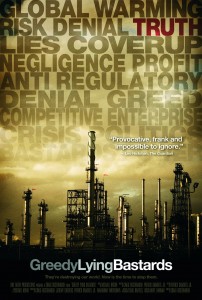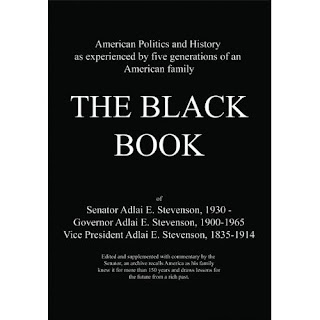Greedy Lying Bastards
Posted on March 7, 2013 at 6:00 pm
B+| Lowest Recommended Age: | Middle School |
| MPAA Rating: | Rated PG-13 for brief strong language |
| Profanity: | Brief strong language |
| Alcohol/ Drugs: | None |
| Violence/ Scariness: | Scenes of environmental devastation |
| Diversity Issues: | None |
| Date Released to Theaters: | March 8, 2013 |
 Greedy Lying Bastards is a documentary that takes on two problems — the pernicious impact of industry on the environment and the effect of those changes on communities and the even more pressing problem of the pernicious impact of a small group of corporate executives on politicians and the laws they enact and enforce. As the title makes clear, this is a powerful attack that does not pull any punches or pretend to be objective. It’s no longer an inconvenient truth. It is a question of our survival being put at risk by a few wealthy people who are so determined to get even wealthier that they are either in denial about the consequences or just do not care. The case it makes is dramatic and disturbing.
Greedy Lying Bastards is a documentary that takes on two problems — the pernicious impact of industry on the environment and the effect of those changes on communities and the even more pressing problem of the pernicious impact of a small group of corporate executives on politicians and the laws they enact and enforce. As the title makes clear, this is a powerful attack that does not pull any punches or pretend to be objective. It’s no longer an inconvenient truth. It is a question of our survival being put at risk by a few wealthy people who are so determined to get even wealthier that they are either in denial about the consequences or just do not care. The case it makes is dramatic and disturbing.
The late Senator Daniel Patrick Moynihan used to say that “everyone is entitled to his own opinion but no one is entitled to his own facts.” In this film, documentarian Craig Rosebraugh shows how a very small group of unfathomably wealthy industrialists create research and lobbying organizations designed to appear objective and broadly supported but in reality with no commitment to scientific data or to public policy. The most telling information in this film concerns the lack of transparency and accountability of organizations that have such a pervasive impact on legislation and policy. Washington insiders are already very familiar with the story of the Bush administration’s suppression of the most significant scientific report on climate change under the direction of an oil industry lobbyist serving a brief time in the government and allowing his former (and future) employers to edit the report’s findings. But seeing the details of the story in the context of a widespread and chillingly effective program by the Koch brothers and others is very compelling.
It would be nice to have some updates about the most recent campaign and Obama administration. . And while Rosebraugh has some good footage (thanks to a sneaky photo-pen) from the no-cameras-allowed Exxon shareholder meeting, he fails to connect the dots between what these executives do with corporate money and the true owners of the company — the shareholders, mostly through intermediaries like pension funds and mutual funds. As the comic strip character Pogo said when he discovered trash in a once-pristine river, “We have met the enemy and he is us.”
The “what you can do” section at the end should include more than just contacting elected officials, who need the corporate money to win elections. Capitalism is as much at risk from this failure of accountability as the environment. Perhaps that point could be made in Part 2.
Parents should know that this film has brief strong language and scenes of environmental devastation.
Family discussion: Who is in the best position to counter the messages sent by corporate-funded organizations to politicians? Where do you get your most trustworthy information about these issues? How do you know?
If you like this, try: “An Inconvenient Truth,” “FLOW: For Love of Water,” and “End of the Line”



